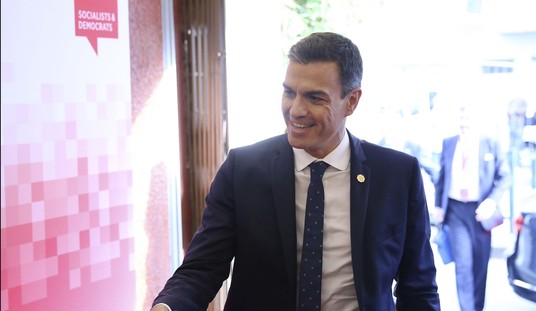You realize Tucker Carlson’s going to be NSA by the end of the year, right? And Hannity will be so jealous.
President Trump bucked most of his top national-security advisers by abandoning retaliatory strikes in Iran on Thursday. In private conversations Friday, Mr. Trump reveled in his judgment, certain about his decision to call off the attacks while speaking of his administration as if removed from the center of it.
“These people want to push us into a war, and it’s so disgusting,” Mr. Trump told one confidant about his own inner circle of advisers. “We don’t need any more wars.”
No, no, just kidding. I think Trump has Tucker lined up for Secretary of Defense.
Then, next year, he’ll start trash-talking him on Twitter for being too wimpy.
Seriously, I don’t know why he persists in staffing up with people like Bolton who he seems to regard as reckless warmongers. It’s true that doves aren’t easy to find in the Republican natsec establishment, but just because he’s stuck choosing among hawks doesn’t mean he has to hire farking superhawks who are destined to irritate him with their penchant for aggression. It’s not just Bolton: Supposedly two of the candidates whom the White House has considered in the past for Secretary of Defense are … Lindsey Graham and Tom Cotton, arguably the two most ardent interventionists in the U.S. government. It’d be one thing if Trump were going for a “team of rivals” dynamic where he insists on having hawks around him to challenge his own foreign policy inclinations, but the quote excerpted above eliminates that theory. You shouldn’t put someone in your cabinet whose views you find “disgusting,” period.
In fact, Trump’s rhetoric about Bolton et al. sounds a bit like Iran’s. Ideally having a dove as president and a superhawk as NSA keeps Iran and other U.S. enemies off-balance by leaving them to wonder who’ll prevail in matters of war. Will the inexperienced president assert himself, or will the very experienced advisor persuade him to be more aggressive? It’s a game of good cop/bad cop — ideally. Realistically, notes Graeme Wood, the differences between Trump and Bolton are something Iran and others can exploit to undermine the president’s confidence in his advisors. And weirdly, thanks to Tucker Carlson, their message is being reinforced on Fox News:
If the national security adviser has no heart, and the president has no brain, their adversaries will play their respective deficits off each other, appealing to the heart when the brain says no. Bush and Bolton were at least in general agreement, and the North Koreans’ hope of splitting them was just that—a hope. Presidents have disagreed with their national security advisers before. Now, however, the split is real and visible. National security advisers have, in the past, had confidence that their presidents would at least approach international security issues consistently, so that threats bore the proper menace, and enemies could not respond by waiting around for the boss to change his mind. Bolton never changes his mind, but Trump changes his mind constantly, so who cares?
The Iranian strategy is, as Mike Doran notes, to convince the president that his government is captured and controlled by maniacs, who are whispering bloodthirsty advice to him from within the White House… Whatever Bolton’s faults—and they are considerable—he is one of the only senior national-security officials to have worked on this sort of crisis before, and to wedge him away from the president is to increase the chaos in an already wild administration. Carlson even repeated, on the air and apropos of nothing, a statement of Persian cultural supremacy: “Iran is a sophisticated country,” he said, and its cities “not at all like Riyadh or Dubai,” the seats of Gulf power friendly to Trump and unfriendly to Tehran. I like the poetry of Hafez and Rumi as much as the next person, but it is nonetheless startling to hear Iranian propaganda repeated on Fox News.
A few days ago Carlson referred to Bolton as a “bureaucratic tapeworm,” the sort of interventionist parasite who “live[s] forever in the bowels of the federal agencies, periodically reemerging to cause pain and suffering but never suffering himself.” Dehumanization of a political enemy is strong stuff even for cable news. To watch it happen to Trump’s handpicked national security advisor (and a former colleague of Tucker’s at Fox to boot) on Trump TV is astonishing, particularly knowing how closely Trump follows Carlson’s show and that he and Carlson have spoken privately about Iran policy. Both Iran and Fox primetime are warning the president that he can’t trust his own aides to have his and America’s best interests at heart. And if the quote reported by the Journal up top is accurate, Trump seems to agree.
To his credit, Trump apparently didn’t let Iran off scot-free for bringing down a U.S. drone. This is a potent nonlethal response:
President Trump approved an offensive cyberstrike that disabled Iranian computer systems used to control rocket and missile launches, even as he backed away from a conventional military attack in response to its downing Thursday of an unmanned U.S. surveillance drone, according to people familiar with the matter…
“This is not something they can put back together so easily,” said one person, who spoke on the condition of anonymity because they were not authorized to speak on the record.
My only question is whether that was a one-off or a strike that can be replicated if and when it needs to be. Iran will learn something from it and will create new cyberdefenses in response. If we need to disable their missile defenses next time — in advance of actual airstrikes — presumably it’ll be harder. But then, Trump incurred the same risk with conventional military assets when he ordered military strikes on Thursday, allowed U.S. ships and planes to be pre-positioned, and then called off the attack in the final hours. Iran likely learned something about U.S. capabilities and tactics from that positioning too. “He basically called them up and told them what he was going to do,” complained a retired lieutenant colonel afterward.
By the way, reporting from various media sources, from the Journal to the Times to WaPo to the Daily Beast, now seems to agree on the general facts of what happened on Thursday with Trump calling off the attack. POTUS made it sound afterward as though he hadn’t realized until the final few hours how many Iranians might be killed in America’s “limited” strikes. Not true, say the reports. He was briefed in the morning on possible casualties (“dozens,” claims the Daily Beast) and gave the order to attack anyway, with his top natsec advisors all in favor but Gen. Joe Dunford a bit more cautious, and remained “supportive of military action throughout the day,” per WaPo. By early evening, however, he began asking more questions about casualties. What caused that change of heart? Was he simply deliberating on it or did some dovish friend influence his thinking in the interim? The figure of 150 potential Iranian casualties which he cited supposedly was based on an assessment produced by a Pentagon lawyer — but that was on the high end of projections, a likely death toll if the U.S. attacked in the middle of the day while the targets were fully staffed. In reality, the U.S. was planning to attack before dawn. And an official who spoke to the WSJ says it wasn’t a Pentagon estimate at all but rather one generated by the White House itself, adding that the Pentagon’s estimate wouldn’t have been that high.
Anyway, here’s Bernie Sanders with a cute line about Trump’s restraint: He helped start this fire by tearing up the nuclear deal and reimposing sanctions, and now he wants credit for putting it out?
"He was just doing a limited strike" says the 'Face the nation' host
“Oh…just a limited strike!" @BernieSanders quipped, "Oh, I’m sorry, I just didn't know that it's okay to simply attack another country with bombs. That’s a limited strike? That’s an act of warfare,” pic.twitter.com/JgbLkkakX7
— Currie Dobson (@Ventuckyspaz) June 23, 2019








Join the conversation as a VIP Member